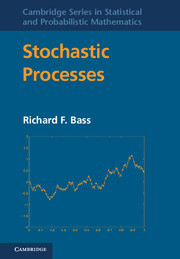Book contents
- Frontmatter
- Contents
- Preface
- Frequently used notation
- 1 Basic notions
- 2 Brownian motion
- 3 Martingales
- 4 Markov properties of Brownian motion
- 5 The Poisson process
- 6 Construction of Brownian motion
- 7 Path properties of Brownian motion
- 8 The continuity of paths
- 9 Continuous semimartingales
- 10 Stochastic integrals
- 11 Itô's formula
- 12 Some applications of Itô's formula
- 13 The Girsanov theorem
- 14 Local times
- 15 Skorokhod embedding
- 16 The general theory of processes
- 17 Processes with jumps
- 18 Poisson point processes
- 19 Framework for Markov processes
- 20 Markov properties
- 21 Applications of the Markov properties
- 22 Transformations of Markov processes
- 23 Optimal stopping
- 24 Stochastic differential equations
- 25 Weak solutions of SDEs
- 26 The Ray–Knight theorems
- 27 Brownian excursions
- 28 Financial mathematics
- 29 Filtering
- 30 Convergence of probability measures
- 31 Skorokhod representation
- 32 The space C[0, 1]
- 33 Gaussian processes
- 34 The space D[0, 1]
- 35 Applications of weak convergence
- 36 Semigroups
- 37 Infinitesimal generators
- 38 Dirichlet forms
- 39 Markov processes and SDEs
- 40 Solving partial differential equations
- 41 One-dimensional diffusions
- 42 Lévy processes
- Appendices
- References
- Index
37 - Infinitesimal generators
Published online by Cambridge University Press: 05 June 2012
- Frontmatter
- Contents
- Preface
- Frequently used notation
- 1 Basic notions
- 2 Brownian motion
- 3 Martingales
- 4 Markov properties of Brownian motion
- 5 The Poisson process
- 6 Construction of Brownian motion
- 7 Path properties of Brownian motion
- 8 The continuity of paths
- 9 Continuous semimartingales
- 10 Stochastic integrals
- 11 Itô's formula
- 12 Some applications of Itô's formula
- 13 The Girsanov theorem
- 14 Local times
- 15 Skorokhod embedding
- 16 The general theory of processes
- 17 Processes with jumps
- 18 Poisson point processes
- 19 Framework for Markov processes
- 20 Markov properties
- 21 Applications of the Markov properties
- 22 Transformations of Markov processes
- 23 Optimal stopping
- 24 Stochastic differential equations
- 25 Weak solutions of SDEs
- 26 The Ray–Knight theorems
- 27 Brownian excursions
- 28 Financial mathematics
- 29 Filtering
- 30 Convergence of probability measures
- 31 Skorokhod representation
- 32 The space C[0, 1]
- 33 Gaussian processes
- 34 The space D[0, 1]
- 35 Applications of weak convergence
- 36 Semigroups
- 37 Infinitesimal generators
- 38 Dirichlet forms
- 39 Markov processes and SDEs
- 40 Solving partial differential equations
- 41 One-dimensional diffusions
- 42 Lévy processes
- Appendices
- References
- Index
Summary
Often a Markov process is specified in terms of its behavior at each point, and one wants to form a global picture of the process. This means one is given the infinitesimal generator, which is a linear operator that is an unbounded operator in general, and one wants to come up with the semigroup for the Markov process.
We will begin by looking further at semigroups and resolvents, and then define the infinitesimal generator of a semigroup. We will prove the Hille–Yosida theorem, which is the primary tool for constructing semigroups from infinitesimal generators. Then we will look at two important examples: elliptic operators in nondivergence form and Lévy processes.
Semigroup properties
Let S be a locally compact separable metric space. We will take ℬ to be a separable Banach space of real-valued functions on S. For the most part, we will take ℬ to be the continuous functions on S that vanish at infinity (with the supremum norm), although another common example is to let ℬ be the set of functions on S that are in L2 with respect to some measure. We use ∥·∥ for the norm on ℬ.
For the duration of this chapter we will make the following assumption.
Assumption 37.1Suppose that Pt, t ≥ 0, are operators acting on ℬ such that
(1) the Ptare contractions: ∥Ptf∥≤∥f∥ for all t ≥ 0 and all f ∈ ℬ,
(2) the Ptform a semigroup: PsPt = Pt+sfor all s, t ≥ 0, and
(3) the Ptare strongly continuous: if f ∈ ℬ, then Ptf → f as t → 0.
- Type
- Chapter
- Information
- Stochastic Processes , pp. 286 - 301Publisher: Cambridge University PressPrint publication year: 2011



